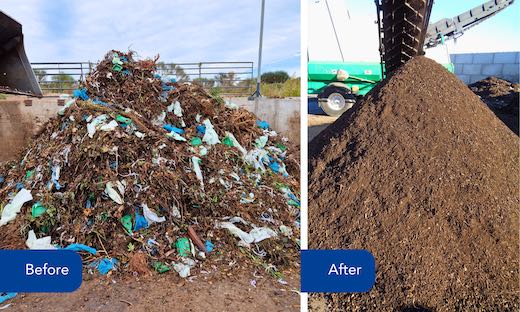Compostable Bioplastics Biodegrade in Real Conditions, Study Confirms
Press release from the issuing company

The start of the test (left): certified compostable shopping bags, trays, coffee capsules and films are mixed with organic waste at the. After composting (on the right side) compostable plastics are disintegrated and biodegraded.
GORINCHEM, The Netherlands – Chaire CoPack, in partnership with AgroParisTech and the University of Montpellier, has conducted a scientific study that validates the biodegradation of certified compostable food contact packaging in industrial composting facilities. The preliminary report of this study provides conclusive evidence that certified compostable packaging is a viable sustainable solution to waste management in the food packaging industry.
The composting test used 20 tons of food- and bio-waste collected from households, along with 323 kg of assorted certified compostable packaging. In parallel, a 'control' compost test was conducted with no packaging added.
"We are thrilled to see the findings of this study," said Paolo La Scola, the Public Affairs Manager at TotalEnergies Corbion. "The results send a strong signal to governments across Europe to grant certified compostable plastics access to biowaste collection and composting infrastructure. It’s necessary to reduce plastic waste mismanagement."
The research, carried out over a four-month period from October 2022 to February 2023, took place with real industrial composting conditions without forced aeration. Researchers from the University of Montpellier and AgroParisTech monitored the study in collaboration with the industrial composting platform of the Syndicat de Centre Héraut in Aspiran.
The study examined commercially available food packaging representative of the European market such as compostable bags, film, food trays, and coffee pods composed of different resins certified for industrial composting (EN 13432) or home composting (NF T51-800). These products were made from biodegradable and compostable resins like PLA, PBAT, and complexed starch sourced from members of the French Association of Biobased Compostables, including Novamont and TotalEnergies Corbion.
Regular checks and samples were taken during the composting process. The results of this test showed:
That the addition of certified compostable packaging:
Positively affected the composting yield,
Did not have any negative consequences on the agronomic quality of the final compost,
Did not generate ecotoxicity to higher plants, earthworms, and daphnia,
All tested materials fully met the decay rate requirements of the compostability standards.
That, regarding the fate of residual compostable microfragments in the soil:
Immediate further biodegradation of these fragments was demonstrated,
The rate of biodegradation increased as the fragments spent more time in the compost.
“These findings are one of many reports, such as the 2020 study by Wageningen University, that proves that compostable packaging is an essential tool for increasing the collection of food waste and enabling its efficient conversion into compost,” La Scola continues. “It is essential that all stakeholders along the value chain cooperate for the recognition of the benefits of compostable packaging in separate collection and recycling of food waste.”
The report is currently under review. To see the preliminary report, click here.
- Questions to ask about inkjet for corrugated packaging
- Can Chinese OEMs challenge Western manufacturers?
- The #1 Question When Selling Inkjet
- Integrator perspective on Konica Minolta printheads
- Surfing the Waves of Inkjet
- Kyocera Nixka talks inkjet integration trends
- B2B Customer Tours
- Keeping Inkjet Tickled Pink
© 2024 WhatTheyThink. All Rights Reserved.














